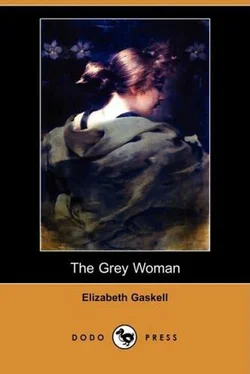The life in Carlsruhe was very different from what it was at home. The hours were later, the coffee was weaker in the morning, the pottage was weaker, the boiled beef less relieved by other diet, the dresses finer, the evening engagements constant. I did not find these visits pleasant. We might not knit, which would have relieved the tedium a little; but we sat in a circle, talking together, only interrupted occasionally by a gentleman, who, breaking out of the knot of men who stood near the door, talking eagerly together, stole across the room on tiptoe, his hat under his arm, and, bringing his feet together in the position we called the first at the dancing-school, made a low bow to the lady he was going to address. The first time I saw these manners I could not help smiling; but Madame Rupprecht saw me, and spoke to me next morning rather severely, telling me that, of course, in my country breeding I could have seen nothing of court manners, or French fashions, but that that was no reason for my laughing at them. Of course I tried never to smile again in company. This visit to Carlsruhe took place in 89, just when every one was full of the events taking place at Paris; and yet at Carlsruhe French fashions were more talked of than French politics. Madame Rupprecht, especially, thought a great deal of all French people. And this again was quite different to us at home. Fritz could hardly bear the name of a Frenchman; and it had nearly been an obstacle to my visit to Sophie that her mother preferred being called Madame to her proper title of Frau.

One night I was sitting next to Sophie, and longing for the time when we might have supper and go home, so as to be able to speak together, a thing forbidden by Madame Rupprecht's rules of etiquette, which strictly prohibited any but the most necessary conversation passing between members of the same family when in society. I was sitting, I say, scarcely keeping back my inclination to yawn, when two gentlemen came in, one of whom was evidently a stranger to the whole party, from the formal manner in which the host led him up, and presented him to the hostess. I thought I had never seen any one so handsome or so elegant. His hair was powdered, of course, but one could see from his complexion that it was fair in its natural state. His features were as delicate as a girl's, and set off by two little "mouches," as we called patches in those days, one at the left corner of his mouth, the other prolonging, as it were, the right eye. His dress was blue and silver. I was so lost in admiration of this beautiful young man, that I was as much surprised as if the angel Gabriel had spoken to me, when the lady of the house brought him forward to present him to me. She called him Monsieur de la Tourelle, and he began to speak to me in French; but though I understood him perfectly, I dared not trust myself to reply to him in that language. Then he tried German, speaking it with a kind of soft lisp that I thought charming. But, before the end of the evening, I became a little tired of the affected softness and effeminacy of his manners, and the exaggerated compliments he paid me, which had the effect of making all the company turn round and look at me. Madame Rupprecht was, however, pleased with the precise thing that displeased me. She liked either Sophie or me to create a sensation; of course she would have preferred that it should have been her daughter, but her daughter's friend was next best. As we went away, I heard Madame Rupprecht and Monsieur de la Tourelle reciprocating civil speeches with might and main, from which I found out that the French gentleman was coming to call on us the next day. I do not know whether I was more glad or frightened, for I had been kept upon stilts of good manners all the evening. But still I was flattered when Madame Rupprecht spoke as if she had invited him, because he had shown pleasure in my society, and even more gratified by Sophie's ungrudging delight at the evident interest I had excited in so fine and agreeable a gentleman. Yet, with all this, they had hard work to keep me from running out of the salon the next day, when we heard his voice inquiring at the gate on the stairs for Madame Rupprecht. They had made me put on my Sunday gown, and they themselves were dressed as for a reception.
When he was gone away, Madame Rupprecht congratulated me on the conquest I had made; for, indeed, he had scarcely spoken to any one else, beyond what mere civility required, and had almost invited himself to come in the evening to bring some new song, which was all the fashion in Paris, he said. Madame Rupprecht had been out all morning, as she told me, to glean information about Monsieur de la Tourelle. He was a propriétaire, had a small château on the Vosges mountains; he owned land there, but had a large income from some sources quite independent of this property. Altogether, he was a good match, as she emphatically observed. She never seemed to think that I could refuse him after this account of his wealth, nor do I believe she would have allowed Sophie a choice, even had he been as old and ugly as he was young and handsome. I do not quite know—so many events have come to pass since then, and blurred the clearness of my recollections—if I loved him or not. He was very much devoted to me; he almost frightened me by the excess of his demonstrations of love. And he was very charming to everybody around me, who all spoke of him as the most fascinating of men, and of me as the most fortunate of girls. And yet I never felt quite at my ease with him. I was always relieved when his visits were over, although I missed his presence when he did not come. He prolonged his visit to the friend with whom he was staying at Carlsruhe, on purpose to woo me. He loaded me with presents, which I was unwilling to take, only Madame Rupprecht seemed to consider me an affected prude if I refused them. Many of these presents consisted of articles of valuable old jewellery, evidently belonging to his family; by accepting these I doubled the ties which were formed around me by circumstances even more than by my own consent. In those days we did not write letters to absent friends as frequently as is done now, and I had been unwilling to name him in the few letters that I wrote home. At length, however, I learned from Madame Rupprecht that she had written to my father to announce the splendid conquest I had made, and to request his presence at my betrothal. I started with astonishment. I had not realized that affairs had gone so far as this. But when she asked me, in a stern, offended manner, what I had meant by my conduct if I did not intend to marry Monsieur de la Tourelle—I had received his visits, his presents, all his various advances without showing any unwillingness or repugnance—(and it was all true; I had shown no repugnance, though I did not wish to be married to him, — at least, not so soon)—what could I do but hang my head, and silently consent to the rapid enunciation of the only course which now remained for me if I would not be esteemed a heartless coquette all the rest of my days?
There was some difficulty, which I afterwards learnt that my sister-in-law had obviated, about my betrothal taking place from home. My father, and Fritz especially, were for having me return to the mill, and there be betrothed, and from thence be married. But the Rupprechts and Monsieur de la Tourelle were equally urgent on the other side; and Babette was unwilling to have the trouble of the commotion at the mill; and also, I think, a little disliked the idea of the contrast of my grander marriage with her own.
So my father and Fritz came over to the betrothal. They were to stay at an inn in Carlsruhe for a fortnight, at the end of which time the marriage was to take place. Monsieur de la Tourelle told me he had business at home, which would oblige him to be absent during the interval between the two events; and I was very glad of it, for I did not think that he valued my father and my brother as I could have wished him to do. He was very polite to them; put on all the soft, grand manner, which he had rather dropped with me; and complimented us all round, beginning with my father and Madame Rupprecht, and ending with little Alwina. But he a little scoffed at the old-fashioned church ceremonies which my father insisted on; and I fancy Fritz must have taken some of his compliments as satire, for I saw certain signs of manner by which I knew that my future husband, for all his civil words, had irritated and annoyed my brother. But all the money arrangements were liberal in the extreme, and more than satisfied, almost surprised, my father. Even Fritz lifted up his eyebrows and whistled. I alone did not care about anything. I was bewitched, — in a dream, — a kind of despair. I had got into a net through my own timidity and weakness, and I did not see how to get out of it. I clung to my own home-people that fortnight as I had never done before. Their voices, their ways were all so pleasant and familiar to me, after the constraint in which I had been living. I might speak and do as I liked without being corrected by Madame Rupprecht, or reproved in a delicate, complimentary way by Monsieur de la Tourelle. One day I said to my father that I did not want to be married, that I would rather go back to the dear old mill; but he seemed to feel this speech of mine as a dereliction of duty as great as if I had committed perjury; as if, after the ceremony of betrothal, no one had any right over me but my future husband. And yet he asked me some solemn questions; but my answers were not such as to do me any good.
Читать дальше













